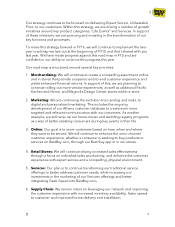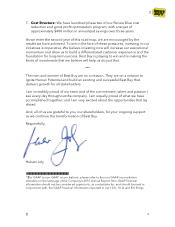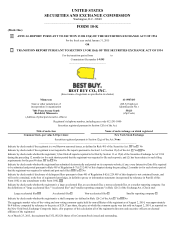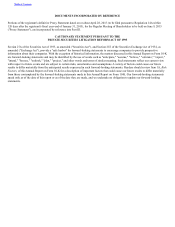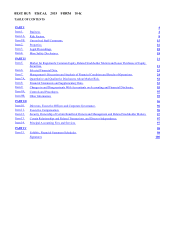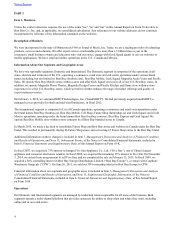Best Buy 2015 Annual Report Download - page 16
Download and view the complete annual report
Please find page 16 of the 2015 Best Buy annual report below. You can navigate through the pages in the report by either clicking on the pages listed below, or by using the keyword search tool below to find specific information within the annual report.
Table of Contents
9
If we fail to attract, develop and retain qualified employees, including employees in key positions, our business and
operating results may be harmed.
Our performance is highly dependent on attracting and retaining qualified employees, including our senior management team
and other key employees. Our strategy of offering high quality services and assistance for our customers requires a highly
trained and engaged workforce. The turnover rate in the retail industry is relatively high, and there is an ongoing need to recruit
and train new employees. Factors that affect our ability to maintain sufficient numbers of qualified employees include
employee morale, our reputation, unemployment rates, competition from other employers and our ability to offer appropriate
compensation packages. Our inability to recruit a sufficient number of qualified individuals or failure to retain key employees
in the future may impair our efficiency and effectiveness and our ability to pursue growth opportunities. In addition, a
significant amount of turnover of senior management employees with specific knowledge relating to us, our operations and our
industry may negatively impact our operations.
Consumer demand for the products and services we sell could decline if we fail to maintain positive brand perception
and recognition.
We operate a portfolio of brands with a commitment to customer service and innovation. We believe that recognition and the
reputation of our brands are key to our success. The proliferation of web-based social media means that consumer feedback and
other information about our company are shared with a broad audience in a manner that is easily accessible and rapidly
disseminated. Damage to the perception or reputation of our brands could result in declines in customer loyalty, lower
employee retention and productivity, vendor relationship issues, and other factors, all of which could materially affect our
profitability.
Our success is dependent on the design and execution of appropriate business strategies.
We operate in a highly-competitive and ever-changing commercial environment. Our success is dependent on our ability to
identify, develop and execute appropriate strategies within this environment. Our current strategy includes transformational
change to many areas of our business, including our online and in-store customer experience, our distribution system, employee
training and engagement, partnership with our vendors, retail execution, services and cost control. We may experience
challenges in achieving the goals we have set, and it is possible that our strategies may prove to be ineffective and that we may
need to make substantial changes to them in future periods. It is also possible that we will be unsuccessful in executing our
strategies, that the strategies we will implement expose us to additional risks or that strategies that have been successful in the
past will fail to produce the desired results. Our results could be materially adversely affected if we fail to design and execute
appropriate strategies. The market value of our common stock and debt instruments could be materially adversely affected if
investors are uncertain about the appropriateness of our strategies or our ability to execute them.
Refer to Item 7, Management's Discussion and Analysis of Financial Condition and Results of Operations, for further
information regarding our strategies.
Failure to effectively manage our property portfolio may negatively impact our operating results.
Effective management of our large property portfolio is critical to our success. We primarily secure properties through
operating leases with third-party landlords. If we fail to negotiate appropriate terms for new leases we enter into, we may incur
lease costs that are excessive and cause operating margins to be below acceptable levels. We may also make term commitments
that are too long or too short, without the option to exit early or extend. The availability of suitable new property locations may
also hinder our ability to maintain or grow our operations. Factors such as the condition of local property markets, availability
of lease financing, taxes, zoning and environmental issues, and competitive actions may impact the availability for suitable
property.
We have closed stores, and we may close additional stores or other facilities in the future. For leased property, the financial
impact of exiting a property can vary greatly depending on, among other factors, the terms of the lease, the condition of the
local property market, demand for the specific property, our relationship with the landlord and the availability of potential sub-
lease tenants. It is difficult for us to influence some of these factors. If these factors are unfavorable to us, then the costs of
exiting a property can be significant. When we enter into a contract with a tenant to sub-lease property, we remain at risk of
default by the tenant and the impact of such defaults on our future results could be significant.


